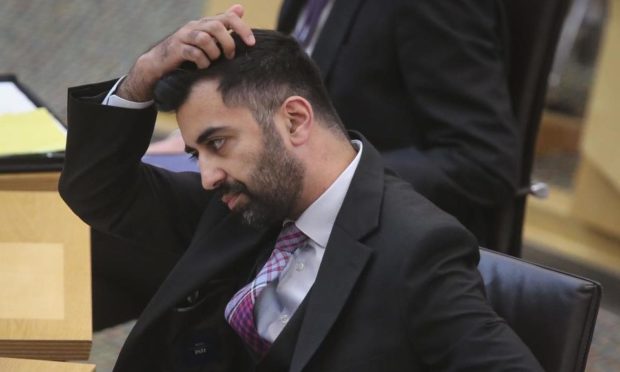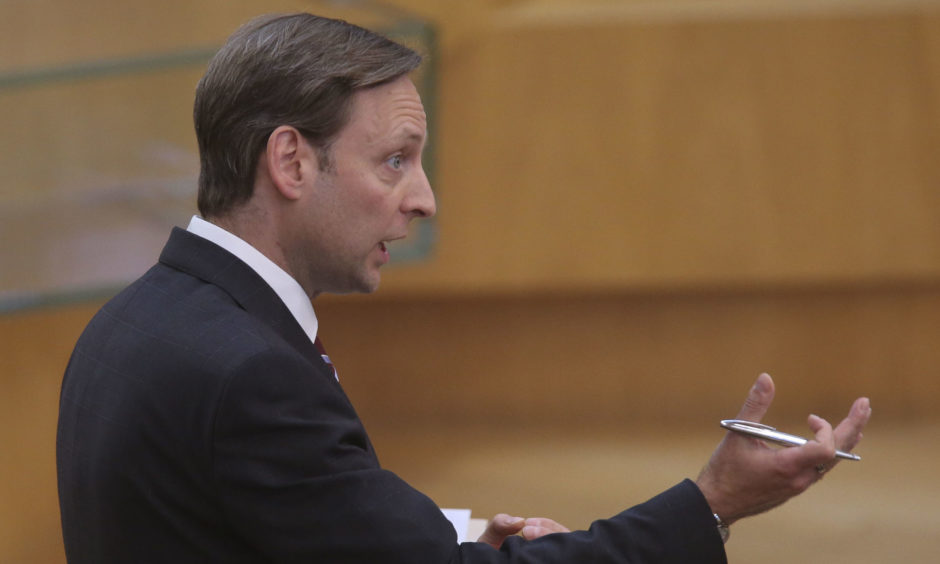Justice Secretary Humza Yousaf has admitted a controversial Hate Crime Bill could lead to “self-censorship”, as he announced the bill will now only prosecute those who intended to stir up hatred.
Against mounting pressure from a range of organisations including the Law Society of Scotland, Scottish Catholic Church and the Scottish Police Federation, Mr Yousaf said he had “reflected carefully” on the concerns the proposals could stifle freedom of speech.
Speaking in the Scottish Parliament, the SNP politician said he recognised there was a “perception” the new offences may be used to prosecute “entirely legitimate acts of expression”, which could lead to “self-censorship” as an unintended consequence.
The hate crime bill, if passed, would extend the offence of stirring up hatred, which currently offers protections based on race, to cover age, disability, religion, sexual orientation, transgender identity and variation in sex characteristics.
Under the initial draft plans, individuals could be prosecuted even if their actions were only deemed “likely” to stir up hatred.
However, Mr Yousaf confirmed to the Scottish Parliament on Wednesday, that he would move amendments, as the bill makes its way through parliament, making it necessary to prove intent.
After arguing there were a number of “protections” built into the existing bill, he said: “Having heard the views expressed both by this parliament and by a range of key stakeholders, I recognise that even with those protections, there is a real risk that if the offences don’t require intent to stir up hatred there could be a perception, and indeed uncertainty, that the operation of this aspect of the offences may be used to prosecute what are entirely legitimate acts of expression.
“This in itself may lead to an element of self-censorship. This is not the aim of the legislation.”
He added that the bill does “not seek to to stifle robust debate or discourse or artistic freedoms”, but to “offer greater protection” to those who suffer from hate crime, while also respecting freedom of expression.
However, the Scottish Conservatives, who this month brought forward a debate to scrap the bill in its entirety, said the “minor” amendments to the bill “do not go anywhere near far enough”.
Liam Kerr, the party’s justice spokesman and north-east MSP, said: “The most controversial piece of legislation in Scottish Parliament history won’t be fixed by tinkering around the margins.
“Our fundamental right to freedom of speech remains under threat.”
Step in the right direction?
Jamie Gillies, spokesman for the Free to Disagree campaign – a coalition of civil liberty groups and free speech proponents set up to oppose the stirring up hatred provisions – agreed the move was a “step in the right direction” but failed to resolve other “seismic issues” with part two of the bill.
He added: “There’s still too low a threshold for offending, the wording is hopelessly vague, free speech provisions are inadequate, there is no ‘dwelling defence’ (to protect remarks made in the privacy of the home) and people outside Scotland could be caught.
“Withdrawing the stirring up offences wholesale is the only way to resolve these complex issues and ensure that other, vital civil liberties are upheld.
“The fact that the government hasn’t done this means opposition to the bill will continue for months to come. It’s a missed opportunity.”
The draft laws have succeeded in uniting both religious and secular organisations in criticism over the potential consequences for freedom of speech.
The Scottish Catholic Church has welcomed the proposed change to prove intent but still has “outstanding concerns” around the potential for “misinterpretation, appropriate defences, and the lack of equity in relation to the freedom of expression provisions”.
Stephen Evans, chief executive of the National Secular Society, said the proposed amendment “doesn’t go far enough”, stating that the stirring up offences “remain unnecessary and excessive” and would “unacceptably erode” freedom of expression in the absence of “more robust” freedom of expression safeguards.
However, some other high-profile organisations that have criticised the bill believe the Scottish Government has listened to their concerns.
David Hamilton, chairman of the Scottish Police Federation, said: “We really welcome that change in policy and I think that will allow the bill to progress quickly and we will look at the later stages as it develops.
“That was the main concern we had and it’s good to see the justice secretary listened and took on board our comments and feedback.”
One of Scotland’s leading QCs, Roddy Dunlop, Dean of the Faculty of Advocates, a high-profile critic of the bill, previously said the draft laws would curb freedom of expression, giving the example it could criminalise comedians who tell the “Scottish, Irishman and Englishman go to a pub” joke.
In response to Mr Yousaf’s announcement, Mr Dunlop, said the organisation welcomed the amendment, as the lack of intent in the initial proposals was one of their “primary concerns” with the legislation.
But he added: “It does not address all of the Faculty’s concerns about potential impact on freedom of expression, and Faculty will continue to work with Government to address those other concerns.”
Meanwhile, the Law Society of Scotland welcomed the Cabinet Secretary’s “willingness to listen” and respond to their “genuine concerns”.
Amanda Millar, president of the organisation, said she believes the amendment will alleviate concerns that offences could be committed by people expressing “controversial views” where they have no intention of stirring up hatred.
I have listened to concerns surrounding Stirring Up Hatred offences proposed in Hate Crime Bill. Have announced that I will remove 'likely' threshold & make new stirring up offences 'intent' only.
I will continue to listen to key stakeholders & opposition as Bill progresses. https://t.co/PPBG7ECzgG
— Humza Yousaf (@HumzaYousaf) September 23, 2020
The Justice Secretary also told MSPs he was “open” to continued dialogue on the bill, including considering “further reforms”.
Kate Wallace, chief executive of Victim Support Scotland, said she hopes the changes will “ease concerns” about the implications of the bill.
“It should allow a renewed focus on its overall purpose: to tackle offending behaviour, and to give the necessary protections for some of Scotland’s most vulnerable people and groups.”



